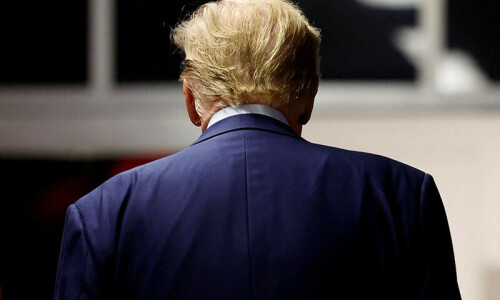PARIS, Oct 15: In a major document published here, the CIA has accused France of having provided Iraq with the aircraft permitting it to carry and launch weapons of mass destruction (WMDs).
In the story, written by Le Monde’s intelligence specialist Jacques Isnard, the CIA — in a 24-page document titled “Iraq’s weapons of mass destruction programme” — is said to have accused France of having provided Iraq with the aircraft — notably the Mirage F1-EQ — which has been specially adapted to carry biological weapons.
According to the document, Iraq adapted its fleet of Mirages back in the 1990s to carry 2200-litre containers of bio-chemical agents under their fuselage, with the report specifying that three types of chemicals were destined to be carried in the containers: permanganate of potassium, glycerine, or bacillus subtilis, also known as Anthrax B.
The report says that tests were carried out at the time at the Abu Obeydi military base near the junction of the Tigris and Euphrates rivers, but the CIA does not specify whether the aircraft remained adapted to carry the biochemical weapons at the time of UN-mandated inspections that ended in 1998.
Isnard notes that although Iraq has received a significant number of military aircraft from Russia, only France is named as being a source of the aircraft that has, according to the CIA, given Iraq the means of transporting WMDs and launching them.
The document also says that France has provided Iraq with “more than 120” Mirage F1-EQs since 1982, but that presently only 12 to 15 of them are in use, the remainder having been “cannibalized” to provide the existing fleet with spare parts.
French intelligence sources have told Isnard that “there exists a basis” for the CIA’s accusations, but that, in their estimation - that of the French Direction generale de la securite exterieure (DGSE, the French equivalent of the CIA) - the CIA is at least just as guilty as the French for toying around with biological weapons, notably with its special operation of 1966 when it spread a non-lethal bio-chemical substance - the well-named bacillus subtilis - in nine stations of the New York subway system, and this, claimed the CIA a decade later, to warn the US government of how vulnerable was America if ever a bacteriological war were launched on its soil.
PRESS BRIEFINGS: The French government, considerably embarrassed in recent weeks when its press spokesmen have presented sometimes contradictory reports with regard to foreign policy — notably when speaking about France’s true position on Iraq — has decided to inaugurate weekly joint press conferences that bring together the spokesmen from the country’s Foreign Affairs and Defence ministries.
Begun Oct 4th, and continued till Oct 11th, the conferences are jointly organized by Jean-Francois Bureau, the head of communications - and chief spokesman - for the French Defence Ministry, and by Francois Rivasseau, who plays the same role at the Quai d’Orsay, the French Foreign Ministry.
AGENCIES ADD: The European Union’s foreign policy chief Javier Solana on Tuesday called on Ukraine to urgently clarify its position on the non-proliferation of weapons, saying the country, which has been accused of selling radar equipment to Iraq, would by “very, very wrong” to think it could break international rules.
“You know very well that in the world we are living in this is a serious business,” Solana told a conference on the Ukraine in the Polish capital, in the presence of dozens of Ukrainian officials.
“As long as you think you can get away with breaching the law on non-proliferation, you are very very wrong,” he added. “I want you to clarify that very very quickly”.
The statement came two days after US and British experts arrived in the Ukrainian capital Kiev to begin investigating allegations that President Leonid Kuchma defied a UN embargo and approved the sale of military radar equipment to Iraq.
Kuchma has denied the charges, which the United States put forward last month after saying it had tapes of a conversation between Kuchma and a top Ukrainian arms export official.
















































Dear visitor, the comments section is undergoing an overhaul and will return soon.